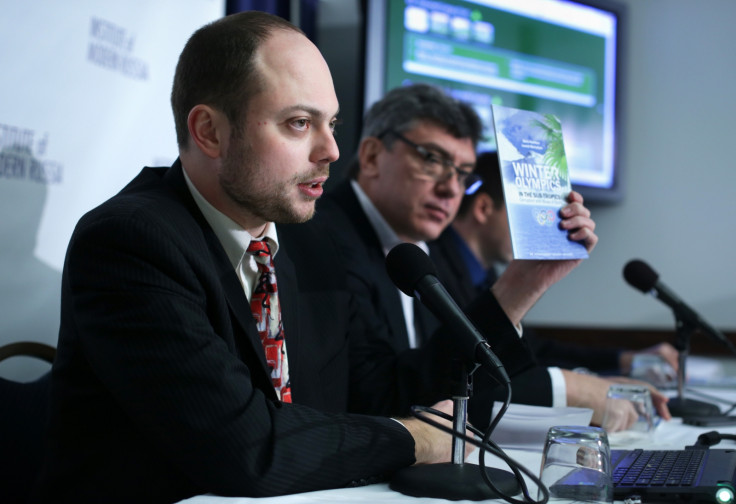Anti-Putin activist Vladimir Kara-Murza remains in a coma after suspected poisoning
Kremlin critic was taken to hospital on 2 February after suddenly falling ill.

A Russian anti-Kremlin activist is in a life-threatening coma due to suspected poisoning, his wife has alleged.
Journalist Vladimir Kara-Murza was taken to the hospital in Moscow on 2 February after suddenly falling ill. The journalist's wife told the New York Times that the doctors finally determined the cause of his illness as "acute intoxication by an unidentified substance", and that he exhibited similar symptoms when he was previously seemingly poisoned, in 2015.
"The onset was just as sudden as last time," Yevgeniya Kara-Murza said. "He is all surrounded by machines and covered in tubes." Other than poisoning, she added, "We don't see any other explanation."
Kara-Murza's wife also said that samples of her husband's blood, hair and fingernails were sent to laboratories in France and Israel to identify the mysterious poisonous substance.
Following the announcement of the journalist's illness, lawyer Vadim Prokhorov shared news about his friend's health on social media in the early morning of 3 February: "His conditions continue to be critical. There is mechanical ventilation, dialysis and other procedures."
After the highly-publicised poisoning in London of Russian defector Alexander Litvinenko in 2006, some worry that Kara-Murza may have been the target of an assassination attempt. Both Prokhorov and Kara-Murza were close associates of the late opposition leader Boris Nemtsov, who was murdered in Moscow's Red Square on 27 February 2015. A few months later, Kara-Murza suffered from a kidney failure and underwent tests showing traces of a poisonous substance in his body.
The journalist, who is the chairman of the Boris Nemtsov Foundation for Freedom, dedicated one of his latest Facebook posts to the politician's memory. He wrote on 1 February: "We're here. We remember".
Мы здеÑÑŒ. Мы помним.
Posted by Vladimir Kara-Murza on Wednesday, February 1, 2017
Kara-Murza had been planning a commemorative rally for the anniversary of Nemtsov's death, opposition politician Ilya Yashin told Deutsche Welle. "Of course Kara-Murza feared for his life," he said. "He took his family to the US but he himself returned and continued his work."
Besides heading the Nemtsov foundation, Kara-Murza also worked for the "Open Russia" foundation of former oil tycoon and Kremlin critic Mikhail Khodorkovsky, who lives abroad after serving 10 years in jail.
Throughout his political activity, Kara-Murza changed party allegiances three times, but was always in opposition to President Vladimir Putin. Most recently, he served as vice-president of the right-wing liberal Parnas opposition party, but left in December 2016 because he opposed the party's inclusion of nationalist politicians on its list.
In January, Kara-Murza submitted a letter critical of Putin's government to the US Senate Foreign Relations Committee during cabinet confirmation hearings for Rex Tillerson, the secretary of state. "There are higher risks than slander or imprisonment for those who oppose the regime," Kara-Murza ominously wrote, as quoted in the New York Times.
Over the weekend, US President Donald Trump was questioned by TV anchor Bill O'Reilly about his relationship with Putin. In the interview, the journalist dubbed the Russian president "a killer". Putin's press secretary Dmitry Peskov demanded an apology on 6 February, slamming the comment as "unacceptable" and "offensive".
A long list of critics of the Russian president have disappeared or been assassinated in mysterious circumstances, often in contract killings, but there is no evidence directly linking Putin to any of the murders.
© Copyright IBTimes 2025. All rights reserved.




















